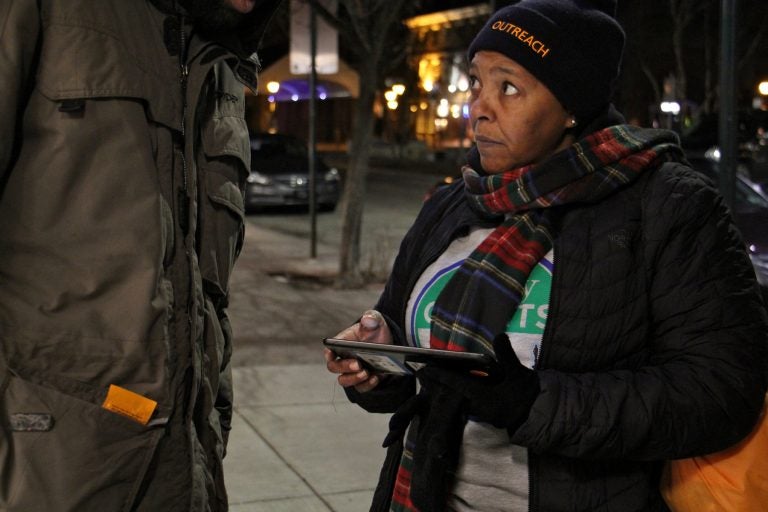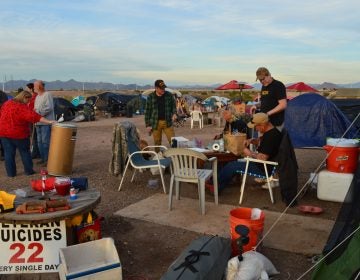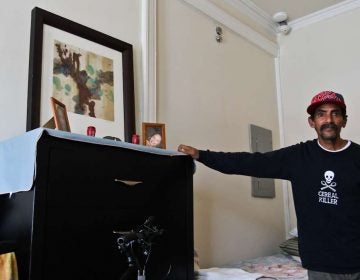Philly’s homeless count program taps help from people who can relate
This year, the city paid some volunteers to help with the count — those who have experience with substance abuse issues, mental health diagnoses or homelessness.
Listen 2:02
Monique Taylor interviews a homeless man near Headhouse Square for the 2018 homeless census. Like many who fanned out across the city Wednesday night, Taylor has experienced homelessness. (Emma Lee/WHYY)
Around 11 p.m. Wednesday, hundreds of volunteers gathered in the basement of Rodeph Shalom synagogue on Broad Street for the annual point-in-time count, a national effort to tally the number of people who are homeless. The U.S. Department of Housing and Urban Development mandates that cities across the country canvass their streets at the end of January each year — the coldest time of year — to get a snapshot of the nation’s homelessness.
In a lively auditorium with upbeat music playing over the PA system, volunteers were grouped into teams and assigned neighborhoods. Each team received a map, a tablet to conduct surveys, a stash of toiletries and water bottles. The teams bundled up, grabbed cups of coffee for the road, and hit the streets.
This year, the city paid some volunteers to help with the count — those who have experience with substance abuse issues, mental health diagnoses or homelessness. Liz Hersh, head of the city’s Office of Homeless Services, said that 40 percent of this year’s point-in-time count volunteers were people who fit this description. The office has had success in years past recruiting and paying young people who had experienced homelessness for the youth count, she said.
“They know where to find people, certainly, how to encourage them to accept help, to feel hopeful, to complete a survey and engage,” said Hersh.
One adult volunteer accepting a stipend was Monique Taylor who was homeless at one point in her life and has struggled with drug and alcohol use, as well as mental health issues. Taylor said she has had trouble staying off the streets, in part, because she didn’t recognize that her addiction and her mental health issues were related.
“Whenever I was in a dark place, drugs was my escape,” she said. “It was escape from my anxiety.”
Taylor did eventually receive help, and she has been in recovery for over three years. She was excited to volunteer for the PIT count as a way to give back.
“They say in recovery you can only keep what you have if you give it away. People helped me in the beginning of my recovery, and they still do, every day.”
Although she was receiving the $72 stipend, Taylor said she would have volunteered without it.
Taylor was joined by three other team members to canvass her assigned area of Old City, Penn’s Landing and Society Hill. They administered several surveys to people they encountered in the park or gathering near convenience stores. The survey questions ranged from demographic information to whether they’d like help in getting shelter for the night. For those who were sleeping, volunteers left a bag of toiletries and included them in the tally.
In 2016, the city counted nearly 5,700 people as homeless, down 7 percent from 2015. While the total number decreased, the number of people sleeping without shelter went up by about 200. In 2016, Philadelphia had the 10th highest total number of people experiencing homelessness in the country.
The rise in opioid use and overdoses has Hersch concerned that this year’s numbers will increase.
“With the opioid crisis, we know that we could be doing everything right, and the numbers would still go up,” she said. “But we need to know. We’re not sticking our heads in the sand. We’re going to look at this crisis in the face and try to do everything in our power to address it.”
The official count for this year’s numbers will be released in March.
WHYY is your source for fact-based, in-depth journalism and information. As a nonprofit organization, we rely on financial support from readers like you. Please give today.





